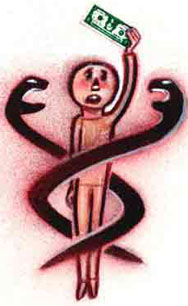 I see a meme developing among conservative-ish opponents of healthcare reform:
I see a meme developing among conservative-ish opponents of healthcare reform:
Megan McArdle: “Democrats are on a political suicide mission; I’m not a particularly accurate prognosticator, but I think this makes it very likely that in 2010 they will lost several seats in the Senate — enough to make it damn hard to pass any more of their signature legislation — and will lose the house outright.”
Sean Trende: “I don’t think they’re close to finding their Grail. I think the better analogy is probably that they’re close to their Moby Dick. And we all know what happens to Captain Ahab once he finally harpoons his white whale.”
Ross Douthat: “Public opinion has turned dramatically against the bill, and every swing-state Democrat who votes for it is courting political suicide.”
Sounds grim! And Trende in particular marshals plenty of wonky, district level evidence to support this view. But I’m going to repeat what I said over the weekend: the Feiler Faster thesis is largely true, and healthcare will be mostly forgotten within a few months. This bill affects a relatively small number of people; the people who are affected are almost all benefitting from it; and nothing much is going to happen until 2014 anyway. The tea partiers will stay mad, but they weren’t going to vote for Democrats in 2010 regardless. Moderates and independents, I think, will end up voting on other issues.
Which isn’t to say that Dems are going to do well in 2010. The economy still sucks, after all, and there’s additional difficult legislation coming down the pike. What’s more, although I doubt that healthcare reform is a suicide run, it’s also true that it doesn’t really offer enough short-term benefits to give people much reason to vote for Democrats.
Still, I think the effect will be moderate at most. The big wild card, though, will be the Jane Hamsher wing of the liberal movement. If, even after healthcare passes, they decide to keep campaigning against it, that could do some real damage. We’ll have to wait and see about that, though.

















